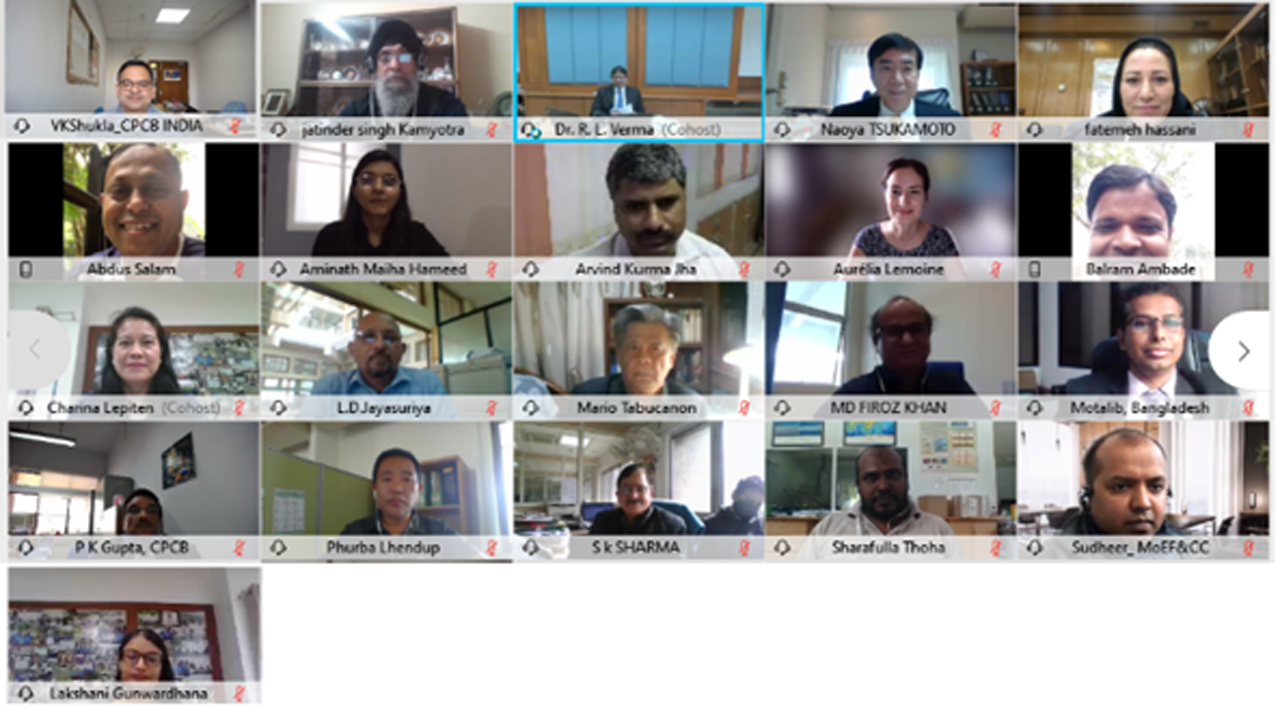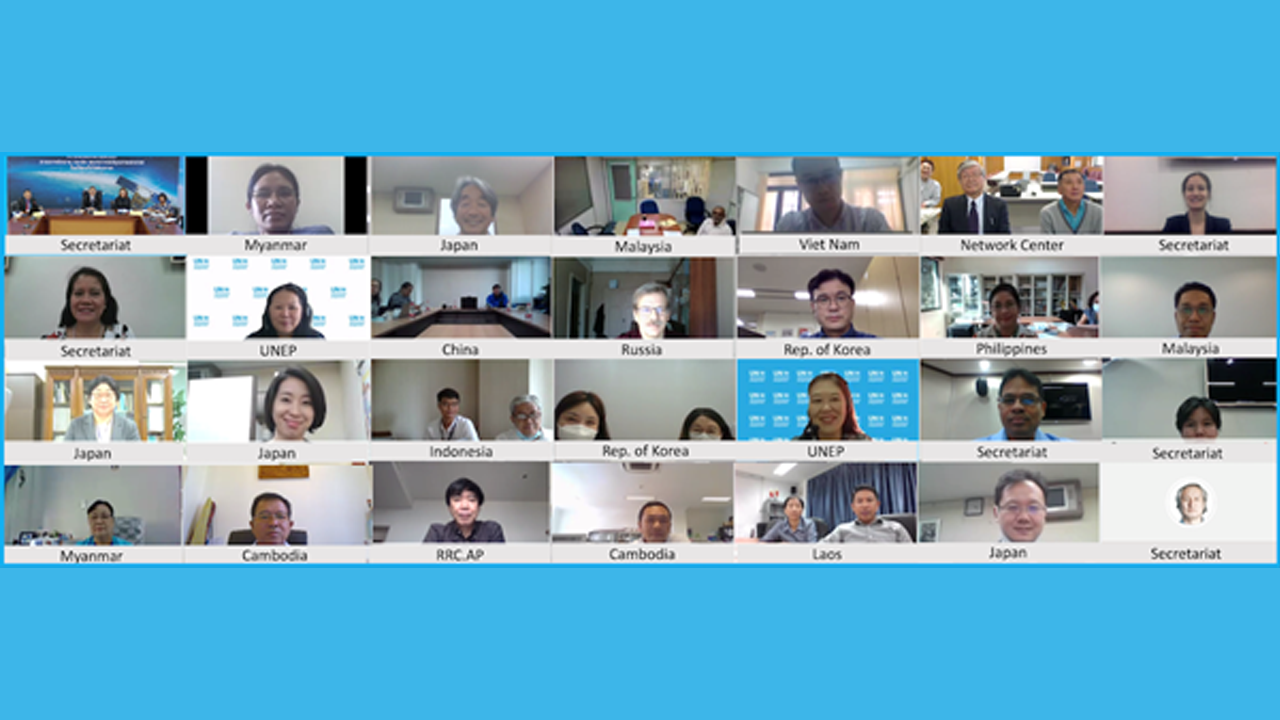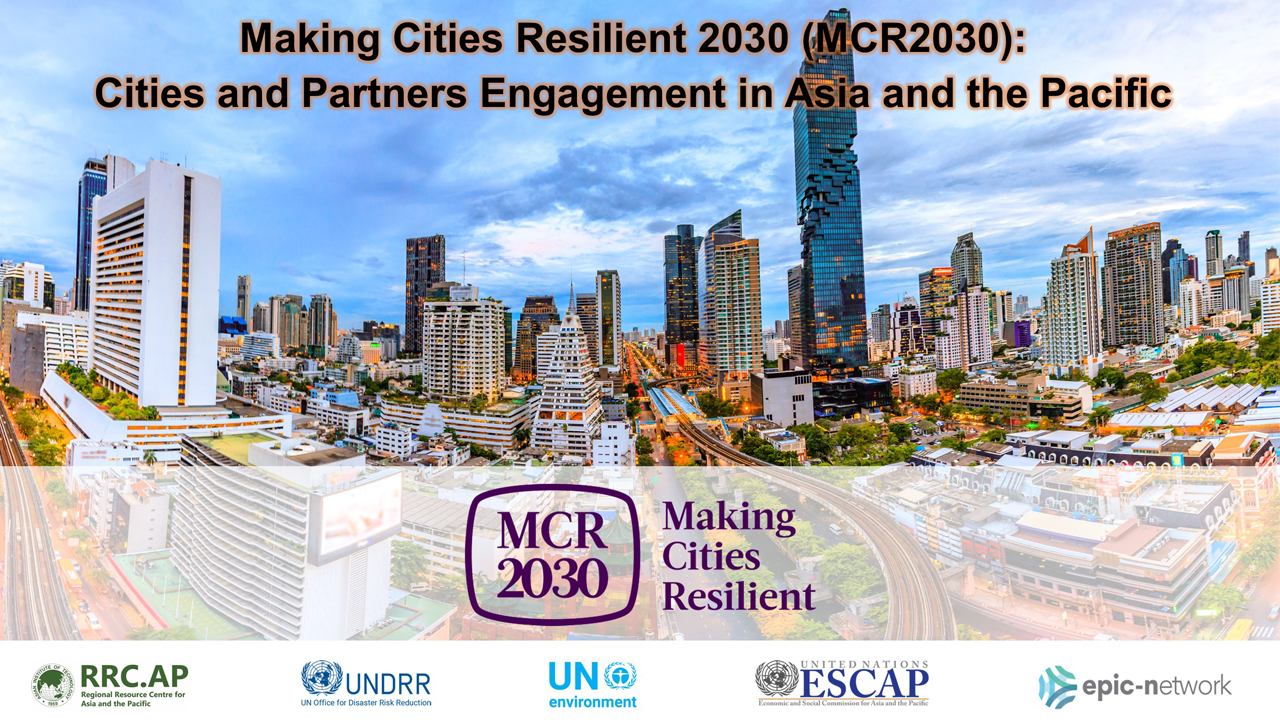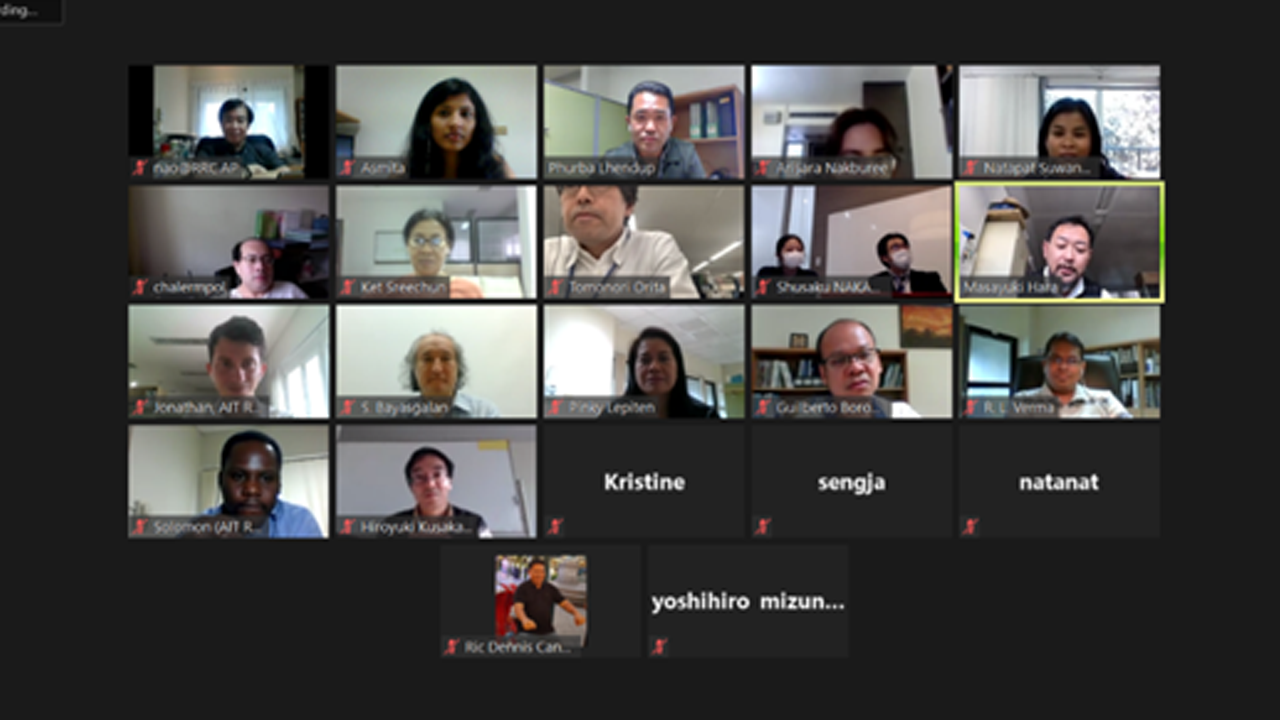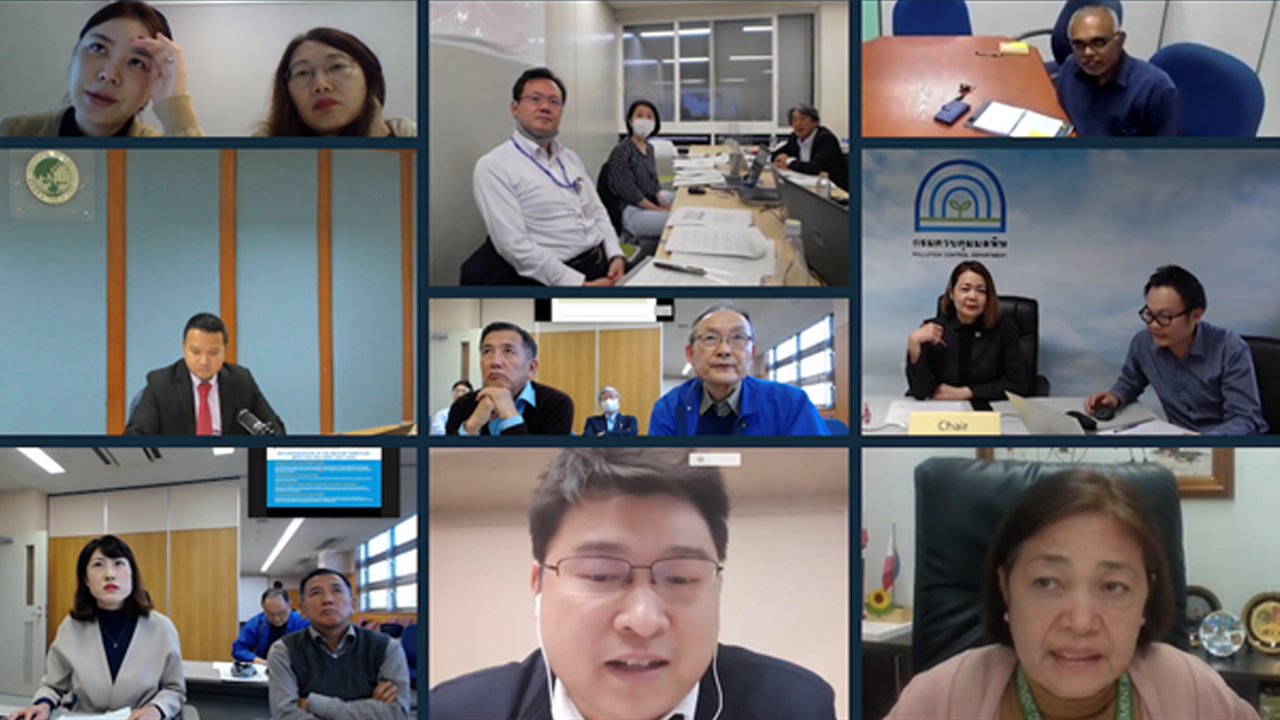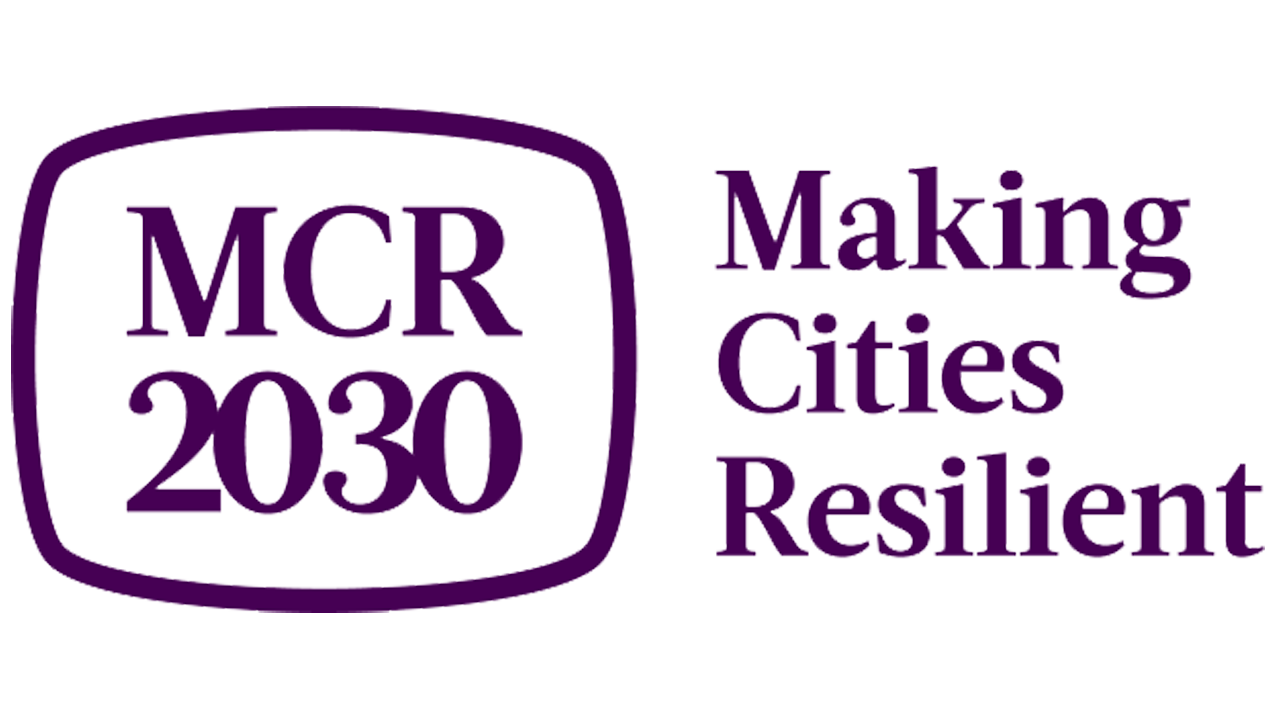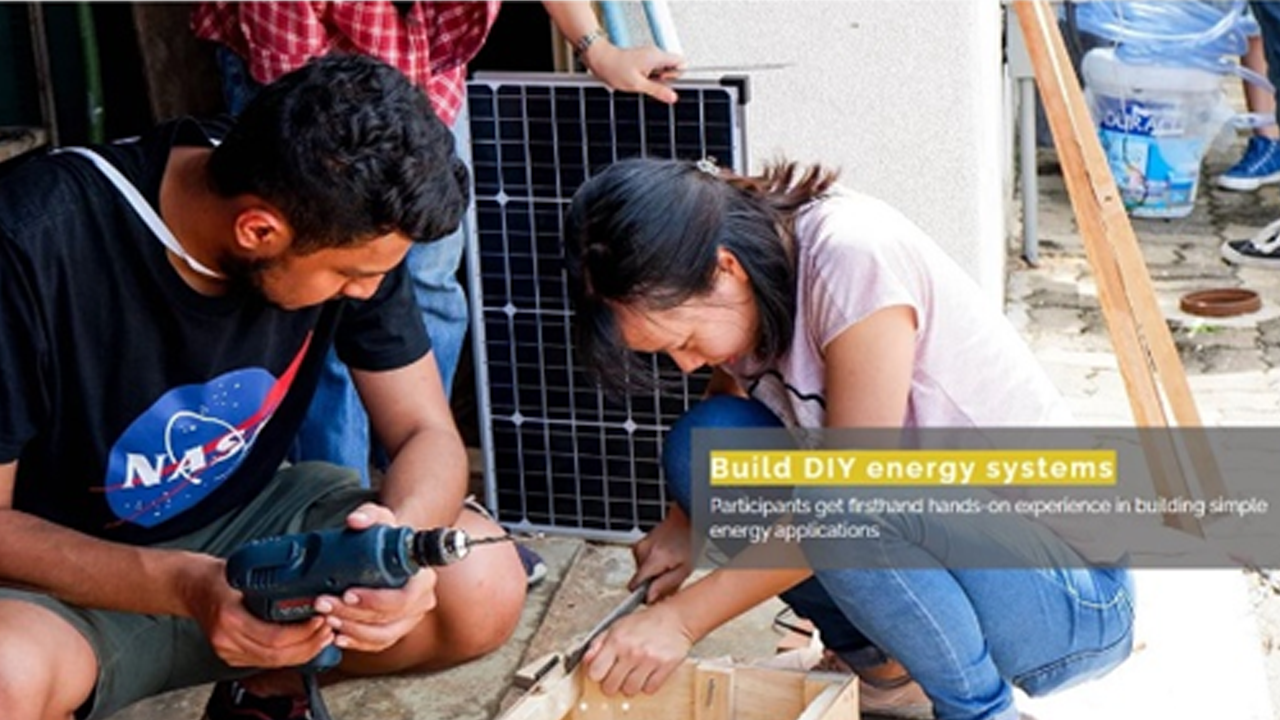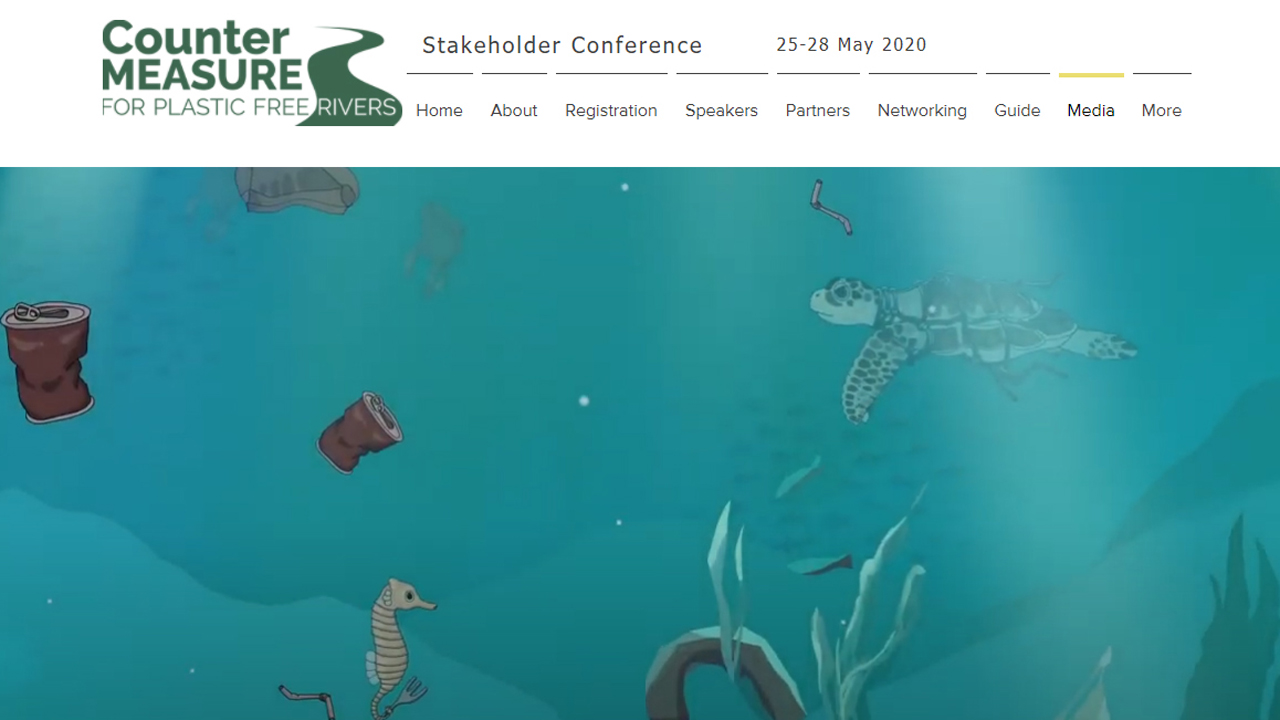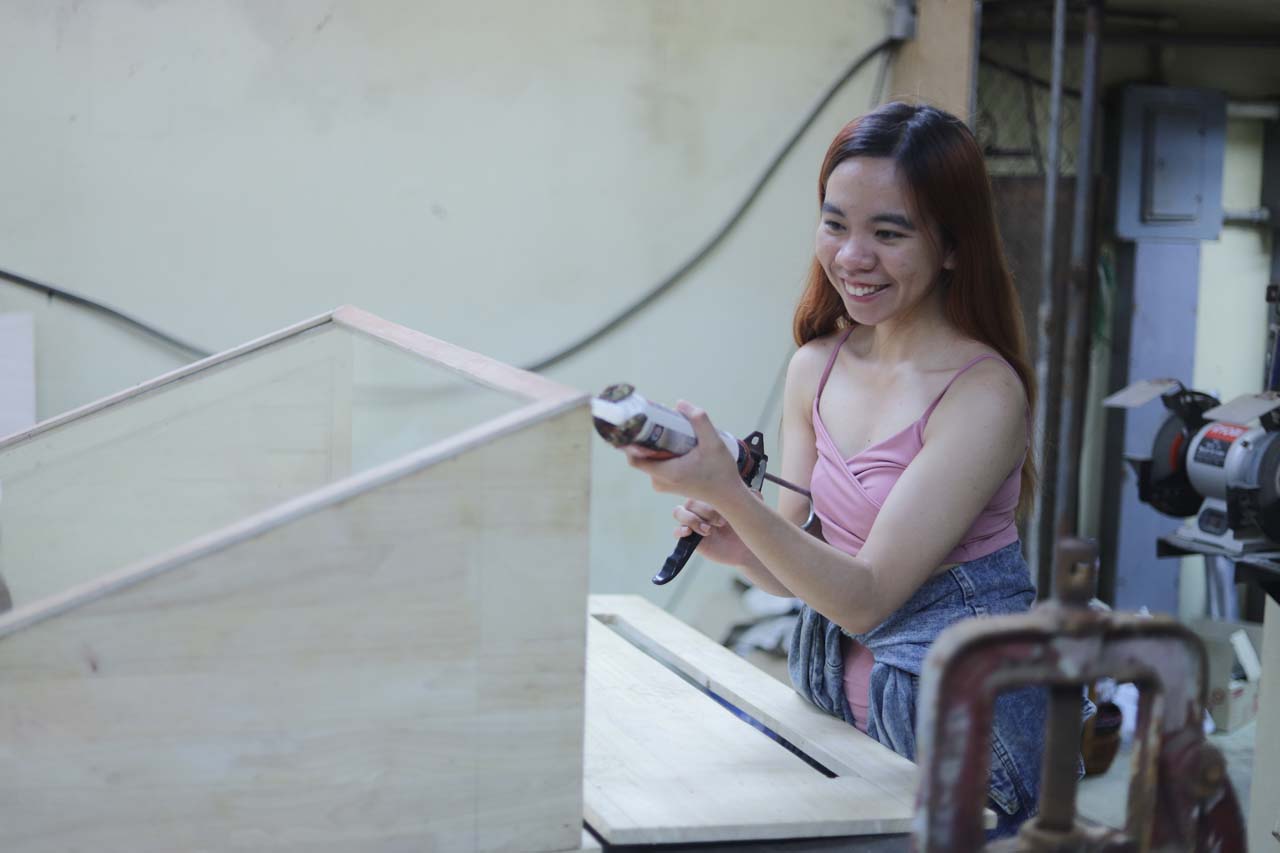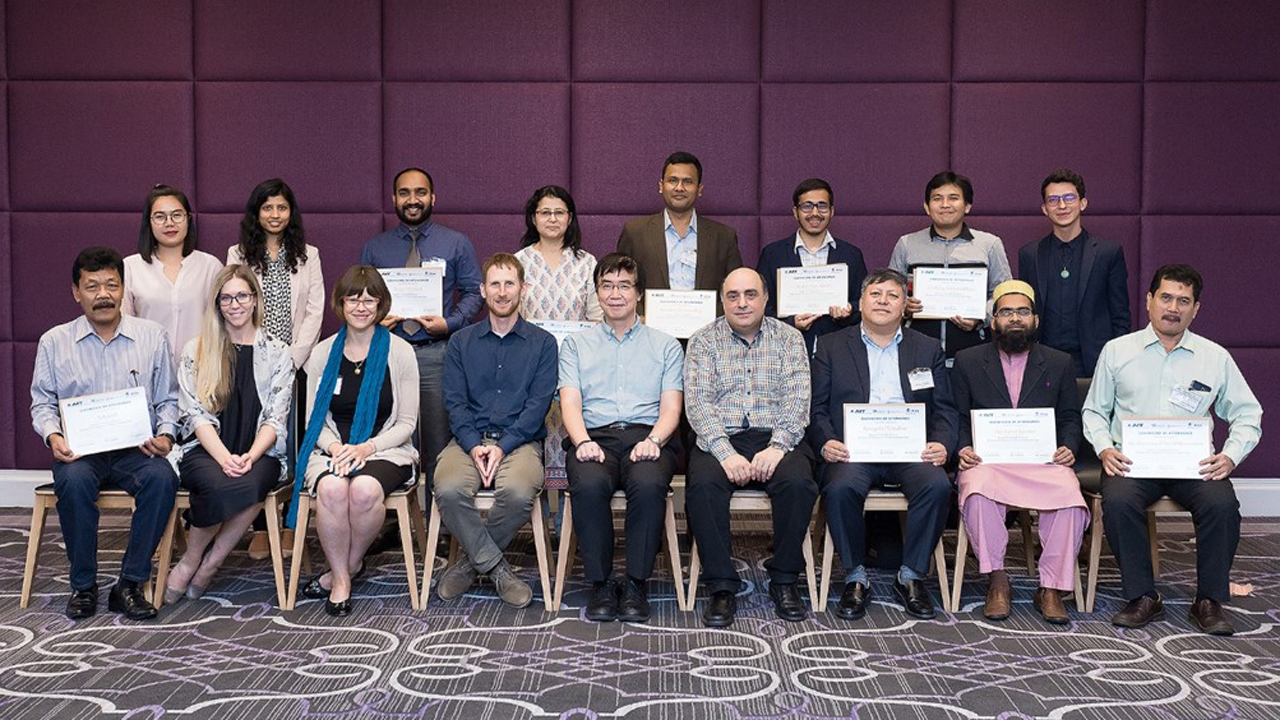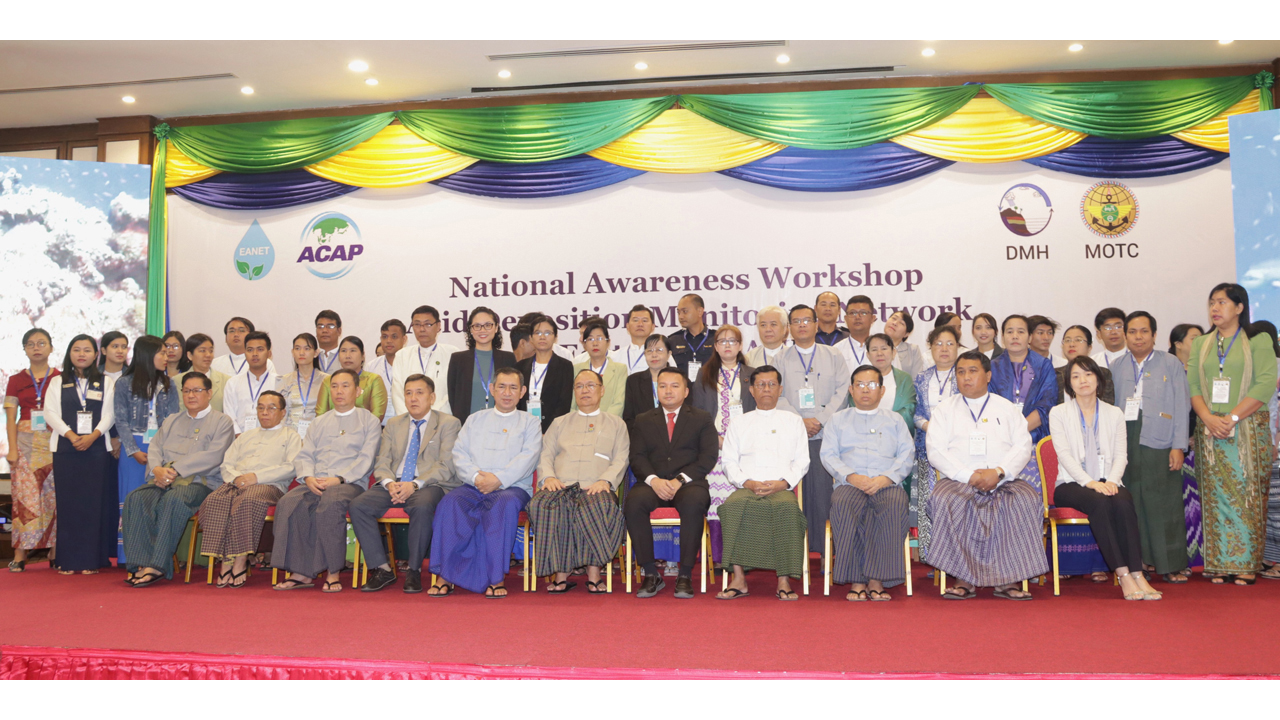Newsletter
Newsletter Archive:
NEWSLETTER
VOL.21 NO.1, JANUARY-DECEMBER 2020
|
||
| > | Meetings and Events
|
|
Webinar on Air Quality Management in Malé Declaration Countries During COVID-19: Current Status, Challenges, and Opportunities
The Malé Declaration on Control and Prevention of Air Pollution and Its Likely Transboundary Effects for South Asia (Malé Declaration) organized the Webinar on the Air Quality Management in Malé Declaration Countries During COVID-19: Current Status, Challenges, and Opportunities on 17 December 2020. The event which successfully gathered around 50 participants from the eight-member countries of the Malé Declaration, namely, Bangladesh, Bhutan, India, Iran, Maldives, Nepal, Pakistan, and Sri Lanka, and some other countries, provided an avenue for sharing and learning of experiences, challenges, and opportunities in air quality management during the COVID-19 pandemic. The country representatives delivered elaborative and informative presentations on the respective status of air quality management in their countries. Some encouraging feedback was received from some participants on the successful conduct of the Webinar. The Secretariat plans to organize similar events to update each other to strengthen the bond and cooperation among the member countries of the Malé Declaration. Twenty-second Session of the Intergovernmental Meeting (IG22) on the Acid Deposition Monitoring Network in East Asia (EANET)
The Twenty-second Session of the Intergovernmental Meeting (IG22) on the Acid Deposition Monitoring Network in East Asia (EANET) was held virtually from 25 to 26 November 2020. Over 50 representatives from the participating countries, namely Cambodia, China, Indonesia, Japan, Lao PDR, Malaysia, Mongolia, Myanmar, Philippines, Republic of Korea, Russia, Thailand, and Vietnam, participated in the Session. The United Nations Environment Programme (UNEP) and the Asia Center for Air Pollution Research (ACAP), which serves as the Secretariat and the Network Center (NC) for the EANET, respectively, and the Asian Institute of Technology, Regional Resource Centre for Asia and the Pacific (AIT RRC.AP) attended the Session. The Session discussed the future scope of activities of the Network. It was concluded by major decisions, such as the approval of the Medium-Term Plan (MTP) (2021-2025), and the Work Programme and Budget of EANET in 2021, as well as the decision to start the process of expanding the scope of the Instrument allowing the EANET to work not only on acid deposition monitoring but on wider air quality and air pollution issues in the near future. The AIT RRC.AP as an implementing partner of the EANET had actively participated and greatly supported the organization of the IG22 meeting. Webinar on Making Cities Resilient (MCR2030): Cities and Partners Engagement in Asia and the Pacific
19 November, 2020
Webinar On 19 November 2020, the AIT RRC.AP organised and hosted a webinar on "Making Cities Resilient 2030 (MCR2030): Cities and Partners Engagement in Asia and the Pacific" in partnership with the United Nations Office for Disaster Risk Reduction (UNDRR), the United Nations Economic and Social Commission for Asia and the Pacific (UNESCAP), the United Nations Environment Programme (UNEP), and the Educational Partnerships for Innovation in Communities – Network (EPIC-N). The webinar gathered 109 (58.5% - Man and 37.7% Woman) resilience enthusiasts of various affiliations (academia, civil societies, international organisations, local government, national government, and private sectors) from 26 countries around the world. The webinar served as an important platform to aware stakeholders on the MCR2030 campaign, discuss best practices, and roadmaps used by different organizations, and share lessons learned in establishing partnership and greater engagement of key stakeholders in strengthening cities' resilience to climate change and disaster risks. The webinar was moderated by Mr. Phurba Lhendup, head of climate change, RRC.AP, and started with a keynote address by Dr. Naoya Tsukamoto, Director of RRC.AP who highlighted the approaches and roadmaps used by different UN agencies and organisations to bring cities in the resilient pathway towards achieving international agreement like the Sendai framework for disaster risk resilience, the new urban agenda, the Paris agreement, and the sustainable development goals. While inviting for innovation to leverage human knowledge and creativity in the context of limited finance for adaptation and resilience, he welcomed the MCR2030 campaign led by the United Nations Office for Disaster Risk Reduction (UNDRR) and expressed RRC.AP's commitment to support the initiative. Training Programme on Pseudo Global Warming Downscaling Using S8DS User-interface
17 November 2020
Virtual Training The AIT RRC.AP convened a virtual training programme on pseudo-global warming downscaling using S8DS user-interface in partnership with the Ministry of Environment, University of Tsukuba and Pacific Consultancy, Japan. The training was divided into three themes - Theme 1: Theoretical session on Pseudo global warming downscaling; Theme 2: Practical session on the use of S8DS user-interface; and Theme 3: Operation and maintenance of S8DS user-interface. The theoretical session on 17 November 2020 focused on the basics of climate downscaling, including dynamic and statistical downscaling, the advantage of pseudo global warming downscaling, and the working principles of the downscaling system. Following the theoretical session, on 20 November 2020, a practical session was organised where participants learned to run the climate projection using the S8DS user-interface. A third session was convened on 17 December 2020 which focused on the operation and maintenance aspects of the downscaling software. Each session was 120 minutes long and the participants from the Highland Research and Development Institute (HRDI), a Thailand-based organisation (2 participants), PhD students from the Asian Institute of Technology (2 participants), and staff from the Regional Resource Centre for Asia and the Pacific (13 participants). EANET Virtual Meeting on Drafting Medium Term Plan and Reviewing Scope of Instrument
20-22 October 2020
Virtual Meeting The Working Group (WG) Session 2 Meeting on Drafting Medium Term Plan for the EANET (Acid Deposition Monitoring Network in East Asia 2021-2025) and on Reviewing Scope of Instrument for the EANET was held virtually from 20-22 October 2020, gathering over 50 representatives from the EANET participating countries. Following the session 1 of the Working Group meeting held in early July 2020. The participants met again online to work together on the Medium Term Plan for the EANET (2021-2025) defining the Network's future activities for the next 5 years, while also discussing a possible expansion of the scope of the EANET's Instrument. During the three day meeting, the National Focal Points and representatives from Cambodia, China, Indonesia, Japan, Lao PDR, Malaysia, Mongolia, Myanmar, Philippines, Republic of Korea, Russia, Thailand and Vietnam joined with the EANET's Secretariat, Network Center and the United Nations Environment Programme teams to discuss in detail how they envision the future of the Network. At the end of the 3-day meeting, the Session agreed on the sets of Recommendations to be submitted to the 22nd Session of the Intergovernmental Meeting (IG22) on 25-26 November 2020, for its approval and endorsement. RRC.AP had worked closely with the EANET Secretariat at UNEP organizing the WG via virtual meeting. RRC.AP was invited to become a member of the MCR2030 (Making Cities Resilient 2030) Asia-Pacific Regional Coordination Committee (RCC)
16 October 2020
Meeting In October, UNDRR Asia and Pacific Regional Office officially invited the AIT RRC.AP to become a member of the MCR2030 Asia-Pacific Regional Coordination Committee (RCC) and participate at the regional planning meetings of the Committee with key regional and core partners. Following the invitation, the AIT RRC.AP submitted an online application to become Regional Partner for the MCR2030 in Asia and the Pacific Region. The MCR2030, a global campaign was officially launched in October 2020 for the next 10-year period to last till 2030. Making Cities Resilient 2030 (MCR2030) is an initiative for improving urban resilience and making cities sustainable through advocacy, sharing knowledge and experiences, establishing city-to-city learning networks, providing technical expertise, enhancing coordination among different level of government, and building partnerships to achieve Sustainable Development Goal 11 (SDG11), the Sendai Framework for Disaster Risk Reduction, the Paris Agreement, and the New Urban Agenda. RRC.AP conducted Virtual Youth Energy Academy (V-YEA)
28 September - 4 October 2020
Virtual Meeting Between 28 September and 4 October 2020, the AIT RRCAP in partnership with Sustainable Energy Youth Network (SEYN) organised the second edition of Youth Energy Academy (YEA) with the support of the Regional Project Energy Security and Climate Change Asia-Pacific of the Konrad Adenauer Foundation (KAS-RECAP). The academy convened 21 participants from 5 Asian countries (Myanmar, Nepal, Pakistan, Philippines, and Thailand) including 7 partners, 14 resource persons, and 5 YEA 2019 alumni (as mentors). The 7-day programme was delivered in close partnership with SEYN and with contributions from other organizations, such as the Department of Energy, Environment and Climate Change, AIT, Yunus Centre, the Klong 6 Community Occupational Learning Center in Pathum Thani, Fosera Thailand in Rangsit, Pathum Thani, and the Tha Manao Community Biogas from Swine Farms in Lopburi, Thailand and other guest speakers. The second edition of Youth Energy Academy was convened virtually to raise awareness, engage, and empower young people to develop sustainable energy projects, increase the potential of project idea implementation, and foster replicability across the region. The Academy used participative, non-formal, and empowering methods to boost creativity and inspire action. Throughout the week participants were engaged through theoretical sessions, practical sessions, and virtual tours. The theoretical sessions delivered through Zoom used interactive presentations, discussions, and exercises while the practical sessions were dedicated to building simple energy systems using "Do It Yourself (DIY)" and "Do It Together (DIT)" approaches. Lastly, the virtual tour served as a proxy for field visits for participants to gain insights on renewable energy technologies and examples of technology applications in the communities. Virtual Conference of the CounterMEASURE Final Stakeholder 25-28 May 2020
Webinar The CounterMEASURE Final Stakeholder Conference was successfully held on 25 to 28 May 2020 virtually. It showcased important achievements of the CounterMEASURE project at its first phase and previewed second phase of CounterMEASURE implementation. The virtual conference highlighted key stories, accomplishments, and innovative solutions – even to the growing concern around the coronavirus (COVID-19) pandemic. Cumulatively, about 1,286 participants from about 58 countries in 5 continents attended the virtual conference. Participants were drawn from include policy makers, researchers, engineers, private sectors, and civil society groups. The conference streamed keynotes, 6 live sessions, workshop with breakout sessions, and press conference through interactive learning and insights sessions from experts. Highlights of the conference include catalyzing future action of CounterMEASURE 1 -- reflecting how the power of data could be unleashed, engagement of media and citizenry to prevent plastic pollution in the region. Other highlights include movement to drive change towards stemming the tide; create more synergy between entities -- intergovernmental and other institutions -- to join the movement to beat plastic pollution; importance of recycling sector in the region -- small scale especially the informal sector support and integration in the waste value chain. Recycling should be feasible and functional in local context; and ensuring appropriate recycling technology to be used for different plastic types/polymers. For more details visit the Conference 2020 CounterMEASURE. Youth Energy Academy (YEA)
5 May 2020
Online The Youth Energy Academy empowers young people to take a leading role in addressing the region’s energy challenges by providing participants with tools for action and by letting them try new things without fear of failure. The AIT RRC.AP has introduced the YEA to Asia in partnership with the Sustainable Energy Youth Network (SEYN) and thanks to the support of the Regional Project Energy Security and Climate Change Asia-Pacific of the Konrad-Adenauer-Stiftung (KAS). YEA is also thanks to inputs from a network of partners and collaborators both within AIT and beyond. Learn more here. Training Workshop on Building Cities’ Resilience to Climate and Disaster Risks
24 February 2020
Bangkok, Thailand RRC.AP, in collaboration with United Nations Office for Disaster Risk Reduction (UNDRR) and the Educational Partnership for Innovation in Communities Network (EPIC-N) with financial support from Ministry of the Environment Japan (MoEJ) organized a five days regional training workshop from 24 – 28 February 2020 at the Sukosol Hotel, in Bangkok, Thailand. This workshop on Building Cities' Resilience to Climate and Disaster risks targeted representatives from national and local government agencies, national or local universities and civil societies. This event was organized to: --Increase political commitment and social demand for climate change and disaster resilient development in line with Sustainable Development Goals (SDGs). --Introduce the Asia-Pacific Adaptation Information Platform (AP PLAT) as a source of open data and useful tools such as the S8 Si-CAT Down-scaler software. --Introduce EPIC - N; its structure, operation method and brainstorm way forward. Participants representing cities from Bangladesh, Indonesia, Maldives, and Nepal gathered to strengthen their knowledge on making their respective cities resilient to climate and disaster risks. The workshop included presentations on the MCR global campaign, UNDRR's ten essentials for making cities resilient, and tools including the disaster resilience scorecard for cities and the Quick Risk Estimation (QRE) tool. Participants from each country used the disaster resilience scorecards to assess their respective city and draft a safe and resilient city action plan. City teams presented their draft Action Plans and discussed objectives, an action plan to meet those objectives, indicators identified and set targets. Further the EPIC-N team introduced their model to the participants, its structure and operation modality and tasked attendees to identify all the stakeholders required to implement this model in their respective countries. EANET National Awareness Workshop
24-25 February 2020
Naypyitaw, Myanmar The Myanmar Awareness Workshop on Acid Deposition and Air Pollution was conducted on 24 to 25 February 2020 in Naypyitaw, Myanmar. The event was organized by the Secretariat for the Acid Deposition Monitoring Network in East Asia (EANET) in collaboration with the Myanmar Department of Meteorology and Hydrology (DMH) and the Ministry of Transport and Communications (MoTC). A total of 60 participants from various sectors, such as agriculture, industries, transport, forestry, health, and education attended the awareness event. They consisted of representatives from the relevant government offices, civil society organizations, development agencies, universities and the private sector. The two-day workshop aimed to facilitate sharing and learning platforms, to increase understanding on issues related to the prevention of air pollution, and to enhance the participants’ knowledge and understanding on managing air quality at their workplaces. Some experts from EANET and other invited speakers shared presentations, and led group discussions, on the current status and development of acid deposition and air pollution monitoring activities, the effects of climate change on acid deposition and air pollution, among others. The participants had the opportunity to discuss challenges, opportunities and potential solutions on air pollution and acid deposition problems from different sectors’ point of view. RRC.AP as an implementing partner of EANET supported the organization of the Myanmar Awareness Workshop. |
||
Regional Resource Centre for Asia and the Pacific (RRC.AP)
E: info@rrcap.ait.ac.th
To Subscribe: http://www.rrcap.ait.ac.th |
